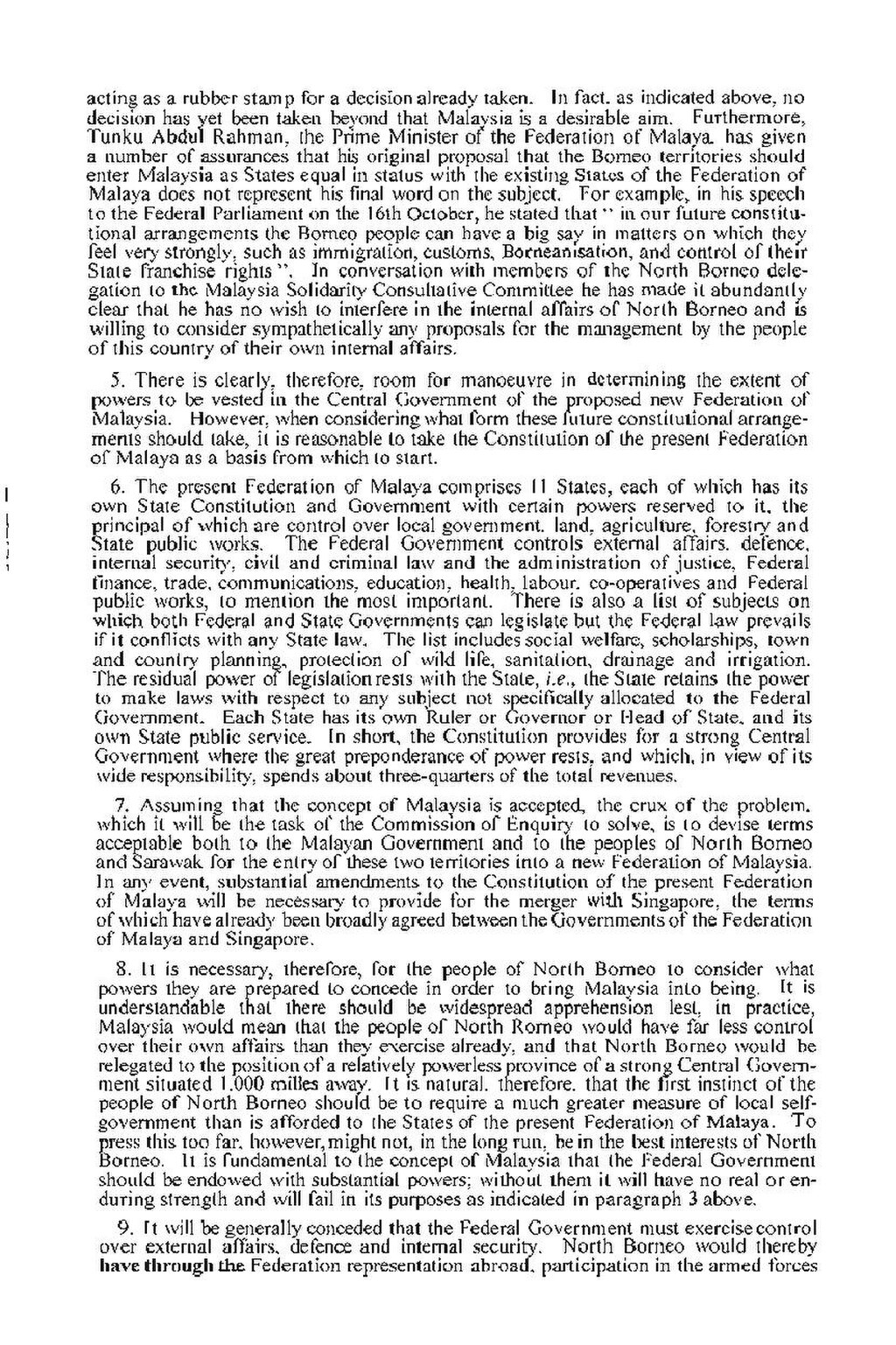acting as a rubber stamp for a decision already taken. In fact. as indicated above, no decision has yet been taken beyond that Malaysia is a desirable aim. Furthermore, Tunku Abdul Rahman, the Prime Minister of the Federation of Malaya. has given a number of assurances that his original proposal that the Bomeo territories should enter Malaysia as States equal in status with the existing States of the Federation of Malaya does not represent his final word on the subject. For example, in his speech to the Federal Parliament on the 16th October, he stated that in our future constitu- tional arrangements the Borneo people can have a big say in matters on which they feel very strongly, such as immigration, customs, Borneanisation, and control of their State franchise rights". In conversation with members of the North Borneo dele- gation to the Malaysia Solidarity Consultative Committee he has made it abundantly clear that he has no wish to interfere in the internal affairs of North Borneo and is willing to consider sympathetically any proposals for the management by the people of this country of their own internal affairs.
5. There is clearly, therefore, room for manoeuvre in determining the extent of powers to be vested in the Central Government of the proposed new Federation of Malaysia. However, when considering what form these future constitutional arrange- ments should take, it is reasonable to take the Constitution of the present Federation of Malaya as a basis from which to start.
6. The present Federation of Malaya comprises 11 States, each of which has its own State Constitution and Government with certain powers reserved to it, the principal of which are control over local government. land, agriculture, forestry and State public works. The Federal Government controls external affairs. defence, internal security, civil and criminal law and the administration of justice, Federal finance, trade, communications, education, health, labour. co-operatives and Federal public works, to mention the most important. There is also a list of subjects on which both Federal and State Governments can legislate but the Federal law prevails if it conflicts with any State law. The list includes social welfare, scholarships, town and country planning, protection of wild life, sanitation, drainage and irrigation. The residual power of legislation rests with the State, i.e., the State retains the power to make laws with respect to any subject not specifically allocated to the Federal Government. Each State has its own Ruler or Governor or Head of State, and its own State public service. In short, the Constitution provides for a strong Central Government where the great preponderance of power rests, and which, in view of its wide responsibility, spends about three-quarters of the total revenues.
7. Assuming that the concept of Malaysia is accepted, the crux of the problem. which it will be the task of the Commission of Enquiry to solve, is to devise terms acceptable both to the Malayan Government and to the peoples of North Bomeo and Sarawak for the entry of these two territories into a new Federation of Malaysia. In any event, substantial amendments to the Constitution of the present Federation of Malaya will be necessary to provide for the merger with Singapore, the terms of which have already been broadly agreed between the Governments of the Federation of Malaya and Singapore.
8. It is necessary, therefore, for the people of North Bomeo to consider what powers they are prepared to concede in order to bring Malaysia into being. It is understandable that there should be widespread apprehension lest, in practice, Malaysia would mean that the people of North Romeo would have far less control over their own affairs than they exercise already, and that North Borneo would be relegated to the position of a relatively powerless province of a strong Central Govern- ment situated 1.000 milles away. It is natural. therefore, that the first instinct of the people of North Borneo should be to require a much greater measure of local self- government than is afforded to the States of the present Federation of Malaya. To press this too far, however, might not, in the long run, be in the best interests of North Borneo. It is fundamental to the concept of Malaysia that the Federal Government should be endowed with substantial powers; without them it will have no real or en- during strength and will fail in its purposes as indicated in paragraph 3 above.
9. It will be generally conceded that the Federal Government must exercise control over external affairs, defence and internal security. North Borneo would thereby have through the Federation representation abroad, participation in the armed forces
